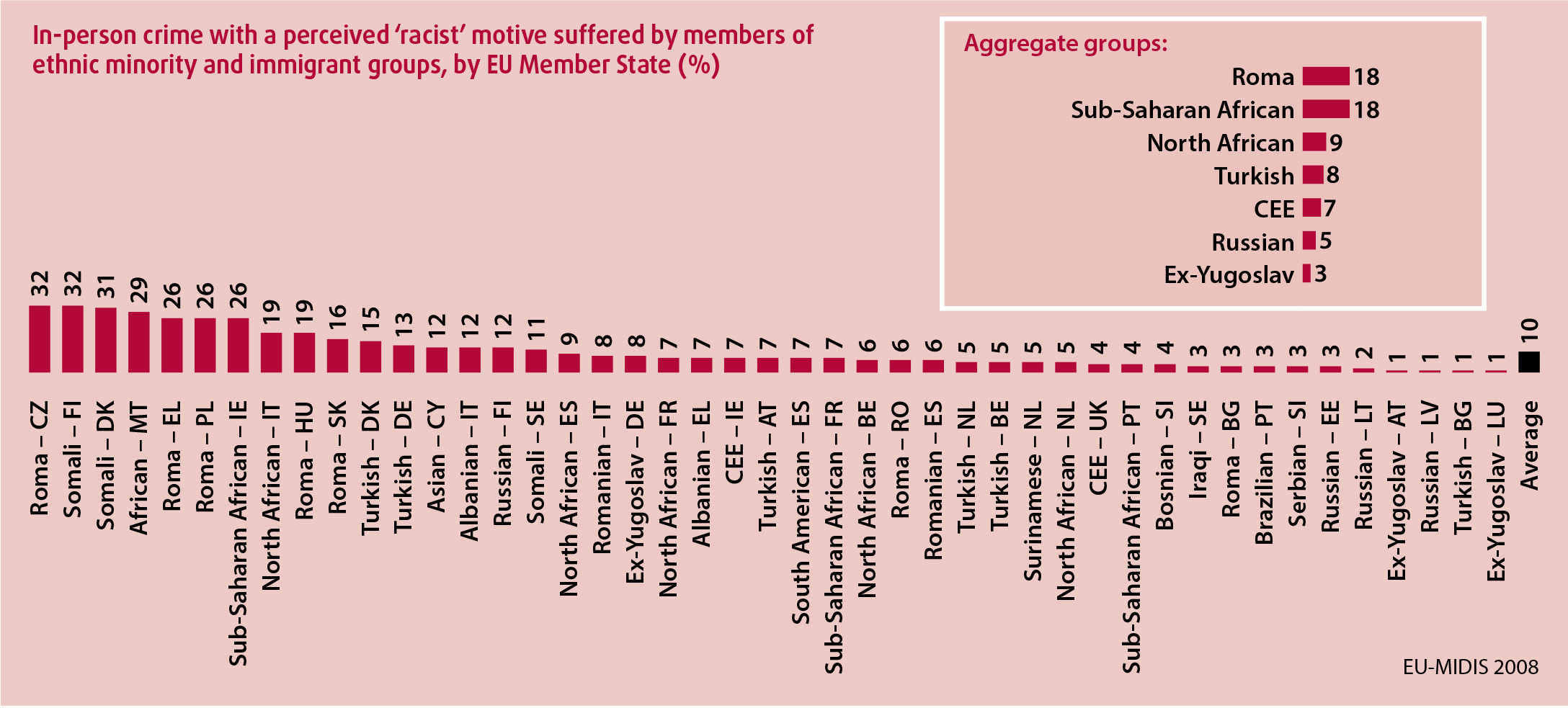Hate crime is a reality in the EU, two new FRA reports show

To combat hate crime, the EU and its Member States need to make these crimes more visible and hold perpetrators to account. Greater political will is needed on the part of decision makers to counter pervasive prejudice against certain groups and compensate for the damage. Victims and witnesses should therefore be encouraged to report such crimes, and legislation should be adopted at the EU and national levels obliging Member States to collect and publish hate-crime data. This would serve to acknowledge victims of hate crime, in line with requirements stemming from the case law of the European Court of Human Rights. To hold perpetrators better to account, legislators should also consider enhanced penalties for hate crimes to stress the severity of these offences, while courts rendering judgments should address bias motivations publicly, making it clear that they lead to harsher sentences.
“Hate crimes create an ‘us and them’ mentality that does tremendous psychological damage”, says FRA Director Morten Kjaerum. “They undermine the basic democratic tenets of equality and non-discrimination. Hate crimes thus harm not only the victim, but also other people belonging to the same group – many of whom are terrified that they will become the next target – and society as a whole. To counter this, the EU and its Member States need to ensure both that such crimes are made visible, and that offenders are made to answer for the damage they have done”.
A new FRA report entitled Making hate crime visible in the European Union: acknowledging victims’ rights outlines a fundamental rights approach to hate crime and offers a comparative analysis of official data collection mechanisms on hate crime in the EU Member States. It highlights challenges inherent in recording hate crime and considers how the scope of official data collection can be broadened to enable Member States to meet obligations toward victims of hate crime.
The second report, EU-MIDIS Data in Focus 6: Minorities as Victims of Crime, presents data on respondents’ experiences of victimisation across five types of crime, from theft to serious harassment. One section of the report looks specifically at minorities as victims of racist crime. The report shows that every fourth person (24 %) of the 23,500 respondents to the EU-MIDIS survey – the first EU-wide survey to specifically sample ethnic minority and immigrant groups on their perception of racially or ethnically motivated crime – said they had been a victim of crime at least once in the 12 months preceding the survey. On average, 18% of all Roma and 18% of all sub-Saharan African respondents in the survey indicated that they had experienced at least one racially motivated crime in the last 12 months.
Assaults, threats or serious harassment with a perceived ‘racist’ motive suffered by members of ethnic minority or immigrant groups (source: FRA - EU MIDIS)

Notes: Question DD4-DE5: Do you think that this incident/any of these incidents in the last 12 month happened partly or completely because of you immigrant/minority background?
Source : FRA, EU-MIDIS Data in Focus 6 – Minorities as Victims of Crime, Figure 5
Victims and witnesses of hate crimes are reluctant to report them, whether to law enforcement agencies, the criminal justice system, non-governmental organisations or victim support groups. As a result, victims are often unable or unwilling to seek redress against perpetrators, with many crimes remaining unreported and unprosecuted and, therefore, invisible.
Non-reporting rates of assaults, threats or serious harassment by minority and immigrant group in the 27 EU Member States (source: FRA - EU MIDIS)
|
|
Central and East European |
Ex- Yugoslav |
North African |
Sub- Saharan African |
Roma |
Russian |
Turkish |
|
Assault or threat |
69 % |
57 % |
62 % |
60 % |
69 % |
69 % |
74 % |
|
Serious harassment |
89 % |
75 % |
79 % |
84 % |
84 % |
84 % |
90 % |
Source : FRA, EU-MIDIS
Making hate crime visible in the European Union: acknowledging victims’ rights
EU-MIDIS Data in Focus 6 on Minorities as Victims of Crime
http://fra.europa.eu/en/publications-and-resources
Note to the editors:
- The European Union Agency for Fundamental Rights (FRA) is mandated to provide evidence-based advice to EU and national decision makers, thereby contributing to more informed and better targeted debates and policies on fundamental rights.
- FRA’s work in the area of hate crime complements that of the Office for Democratic Institutions and Human Rights (ODIHR) at the Organization for Security and Cooperation (OSCE) in Europe, which provides an annual update of hate crime incidents and produces practical guides to help participating states legislate against and counter hate crime.